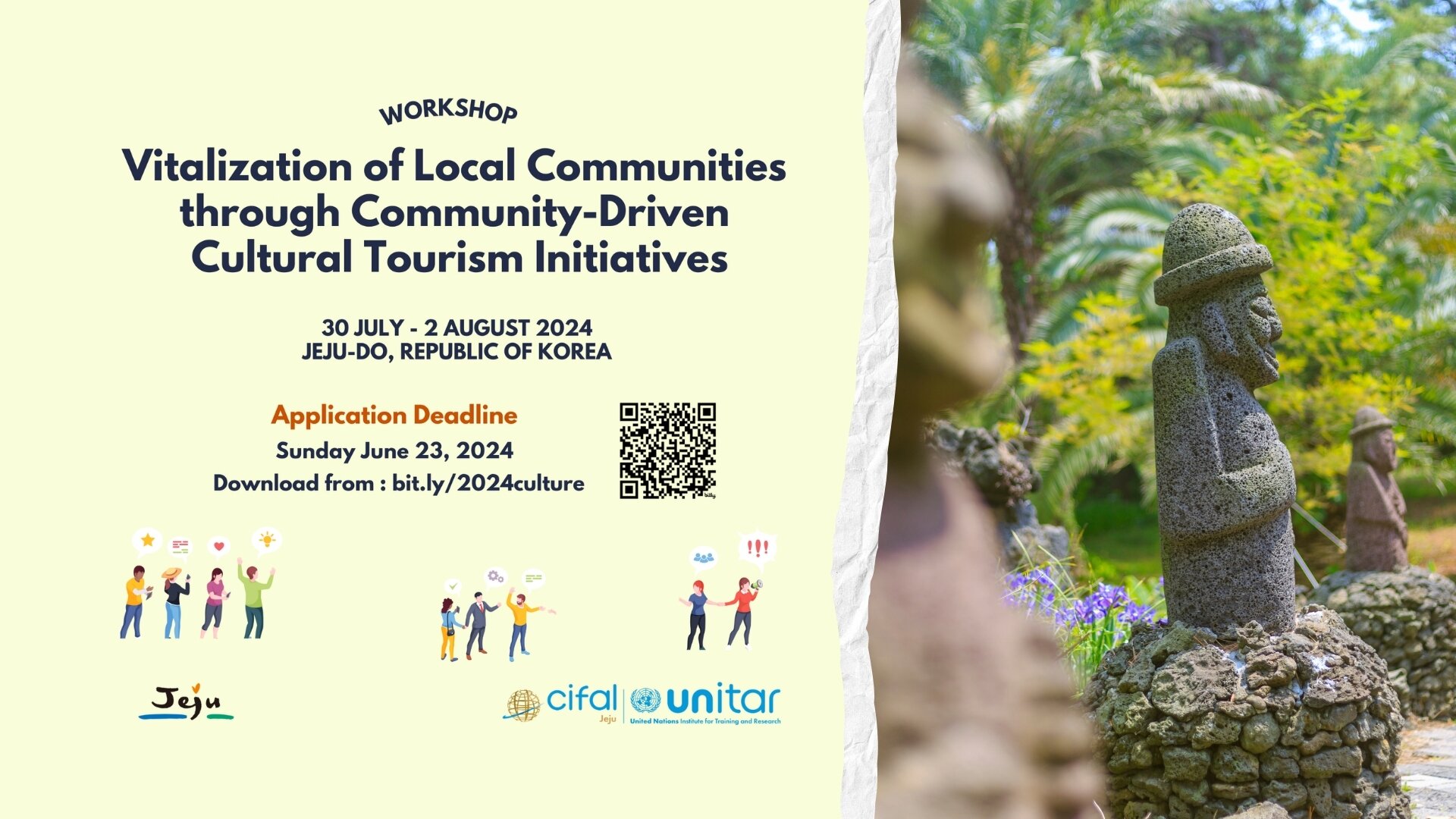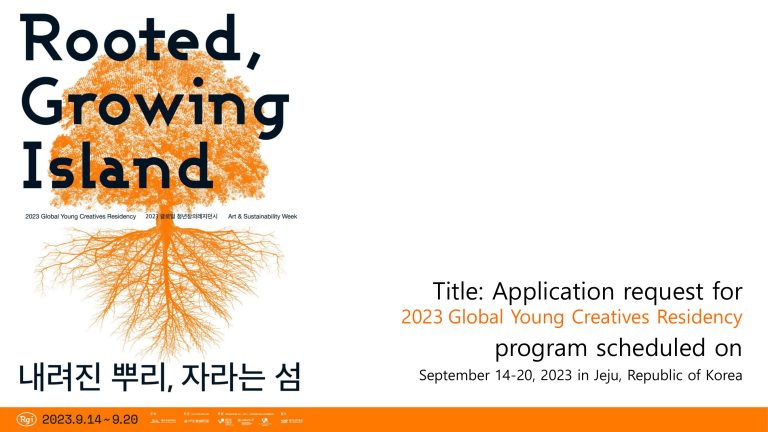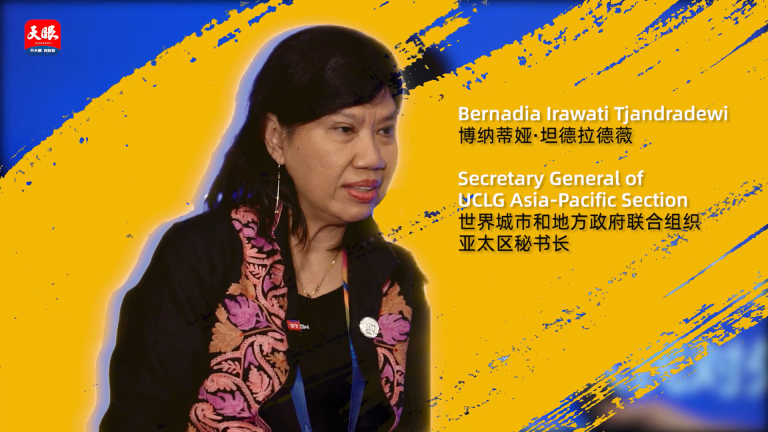30 July – 2 August, 2024
Jeju-do, Republic of Korea
Cultural Resource and Community Engagement: Driver for Local Revitalization
“Culture is key to what makes cities attractive, creative and sustainable. History shows that culture is at the heart of urban development, evidenced through cultural landmarks, heritage and traditions. Without culture, cities as vibrant life-spaces do not exist; they are merely concrete and steel constructions, prone to social degradation and fracture. It is culture that makes the difference.” (UNESCO, 2016)[1] . Culture which widely refers to values, beliefs, knowledge and wisdom[2] has become recognized as a powerful source and the fourth pillar of sustainable development. Considerations for culture in sustainable development in particular at a local level are indispensable for respecting and satisfying people before and after policy development and implementation processes.
Among the crucial roles that culture plays in sustainable development, it can complementarily interact with tourism as tourist destinations invariably showcase their rich and diverse heritage, art, religion and other aspects reflecting their distinctive essence. Culture-based tourism not only holds significant potential to draw visitors intrigued by the culturally distinctive features of each local community, but also fosters economic development by reducing barriers for local communities. Utilizing the unique culture of a community, which is the great resource of tourism, can be a cost effective measure of economic development with its less invested infrastructure compared to other industries.
Despite the economic benefits brought by leveraging culture and its related tourism, however, many countries have been experiencing the negative consequences of reckless development, including the degradation of cultural and natural heritage, loss of cultural features and unequal distributions of economic gains. COVID-19 pandemic further aggravated the existing challenges faced especially by tourism-dependent countries or communities, with increased reports of illegal activities and vandalism taking place at World Heritage properties due to the reduction of monitoring and decrease in managed visitation as well as the raised between- and within-country inequality due to the plummeting tourism revenues.[3] This has led to the shift in paradigm of tourism away from economic profit priority towards resiliency, sustainability and interconnectedness among diverse stakeholders in the sector.[4]
Well-designed plans for sustainable tourism based on local culture are crucial for ensuring the longterm economic, environmental and social benefits. In the face of considerable changes brought about by global urbanization, local communities should preserve their distinctiveness, making culture the focal point of sustainable development efforts for balanced, long-term progress. Inconsiderate and unsustainable policy planning pushing local residents out of the driver’s seat for community vitalization will inevitably lead to the failure of the policy implementation. To prevent negative impacts of inadequate community vitalization policies, countries and local governments need to understand how to effectively incorporate residents’ needs and aspirations into their policies while facilitating an enabling environment for the local stakeholders to be fully engaged in community vitalization through the preservation and utilization of their culture.
Against this backdrop, UNITAR CIFAL Jeju will organize a technical workshop aimed at delivering technical knowledge on utilizing cultural resource for local community vitalization and generating effective and actionable solutions. The workshop will explore the framework and institutional mechanisms necessary for successful implementation and the strategies for collaboration with local stakeholders and residents to ensure their active participation and engagement. CIFAL Jeju will invite experts and practitioners from Korea and around the world to disseminate knowledge and experience relevant to the topic of each Technical Deep Dive. Participants will be encouraged to actively engage in the discussion to figure out the specific challenges they are currently facing and develop solutions to tackle those issues. There will be a site-visit session led by local experts that will allow the participants to learn from the best practices of Jeju. Since this program focuses on problem solving, there will be a session for establishment of the implementation-ready action plans at the last day of the workshop.
- [1] UNESCO (2016) Global Report on Culture for Sustainable Urban Development. Available at: http://unesdoc.unesco.org/images/0024/002459/245999e.pdf [Accessed on 24 Feb, 2017]
- [2] UCLG (2015), Culture 21: Agenda 21 for Culture, Committee on Culture UCLG, Barcelona
- [3] Impacts of COVID-19 on World Heritage to continue for years, according to report, UNESCO World Heritage Convention News, https://whc.unesco.org/en/news/2298
- [4] One Planet Vision for A Responsible Recovery of the Tourism Sector, UNWTO, Available at: https://webunwto.s3.eu-west-1.amazonaws.com/s3fs-public/2020-12/en-brochure-one-planet-vision-responsible-recovery.pdf
Event objectives
The workshop aims to equip participants with the technical knowledge and practical skills necessary for effective policy design to achieve successful community revitalization while raising awareness about the importance of cultural preservation and utilization for sustainable local development.
- Provide a platform for stakeholders engaged in community revitalization to explore technical solutions and best practices in utilizing cultural resource for sustainable development.
- Demonstrate practical methodologies and tools for integrating cultural resource into community revitalization projects, drawing on real-world examples and case studies.
- Facilitate hands-on learning opportunities for participants to develop actionable strategies and implementation plans tailored to their specific contexts.
- Empower participants to apply technical knowledge and skills gained from the workshop to drive tangible outcomes and impact in their communities’ revitalization efforts.
Learning objectives
By the end of the workshop, participants will be able to:
- – Recognize the role of cultural resource in fostering sustainable community revitalization efforts aligned with local development agendas.
- – Appreciate the importance of integrating cultural considerations into urban policies and community revitalization strategies.
- – Share and discuss best practices and case studies of community-driven cultural policies for effective local development.
- – Apply lessons learned from successful cultural policy implementations to develop tailored strategies for their own communities.
- – Formulate and strengthen partnerships with civil societies, governments, and local stakeholders to advocate for and leverage the benefits of cultural resource in community revitalization endeavors.
Target audiences
Central/local authorities, regional and community-based organizations, and stakeholders working within the Asia-Pacific region, who are dedicated to fostering sustainable local development and utilizing cultural resource for sustainable tourism at the community level.
Event details
| Event type | Workshop (training program) |
| Date | 30 July – 02 August 2024 |
| Venue | Jeju-do, Republic of Korea |
| Organizers | UNITAR CIFAL Jeju/JITC & Jeju Special Self-Governing Province in cooperation with UCLG ASPAC (United Cities and Local Governments Asia Pacific) |
| Certificate | UNITAR and UNITAR CIFAL Jeju/JITC will jointly issue a certificate upon the completion of the training. |
Methodology
The training will be comprised of:
- Lectures by invited experts
- On-site lectures by Jeju local experts (Korean to English – interpretation service to be provided)
- Group work/discussion for establishment of implementation-ready action plans
- Field visit to touristic spots related to cultural heritage and local community vitalization
Requirements
Applicants are required to:
- Submit necessary documents on time, i.e., application forms etc.
- Complete and submit pre-training assignment, i.e., case study description etc.
- Actively participate in the training program.
Application and deadline
Send the following documents to cifaljeju.culture@gmail.com by Wednesday June 23, 2024:
| 1. Application form 2. Letter of nomination (formatted by your organization) 3. Letter of commitment 4. Acknowledgment, waiver, and release of liability 5. Consent to collection, usage, and disclosure of personal information 6. Case study description (in word file) | Template in Application form |
| 7. Curriculum Vitae (CV) | Your own format |
** Late application will NOT be accepted.
Note
- Application without the required documents will NOT be considered.
- Participation is subject to the approval of the application by UNITAR CIFAL Jeju/JITC.
- Selected applicants will be notified individually.
Assistance with travel expenses
UNITAR CIFAL Jeju/JITC provides LIMITED financial assistance with the airfare to Jeju-do, Republic of Korea.
| Point of departure | Airfare Assistance Limit | |
| Eastern Asia | China, Macao, and Chinese Taipei | US$ 400 |
| Mongolia | US$ 650 | |
| South-Eastern Asia | Indonesia, Malaysia, Philippines, Singapore, Thailand, and Vietnam | US$ 550 |
| Cambodia, Lao PDR, and Myanmar | US$ 750 | |
| Southern Asia | Afghanistan, Bhutan, India, Maldives, Pakistan, and Sri Lanka | US$ 900 |
| Bangladesh | US$ 950 | |
| Nepal | US$ 1,050 | |
| Pacific Islands | Kiribati, Papua New Guinea, Samoa, Tuvalu, and Vanuatu | US$ 1,300 |
| * Other points of departure – please contact UNITAR CIFAL Jeju/JITC |
- Local expenses (transportation between venue and hotel, accommodation, and meals) during the workshop period will be covered by UNITAR CIFAL Jeju/JITC.
- All other expenses (local transportation within participating countries, visa fee) including during arrival and departure days should be covered by the participants.
Contact
Ms. Seolhee JEON, Program Officer
UNITAR CIFAL Jeju/JITC
227-24, Jungmungwangwang-ro, Seoguipo-si, Jeju-do, Republic of Korea
Phone: +82-64-735-6575
Fax: +82-64-738-4626
E-mail: cifaljeju.culture@gmail.com
Download File











